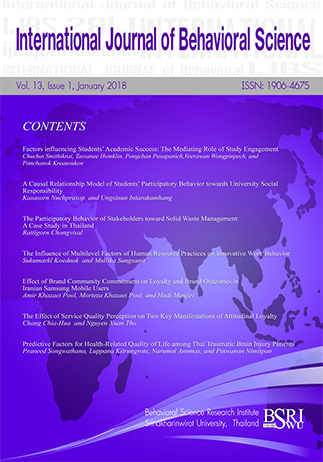The Participatory Behavior of Stakeholders toward Solid Waste Management: A Case Study in Thailand
Main Article Content
Abstract
The purpose of this study was to examine a relationship model between the variables of problem perception of solid waste management, public mind, servant leadership, happiness and well-being that affect the participatory behavior of the stakeholders regarding the solid waste management in Ratchaburi, a province of Thailand.The study sample included community enterprise members, tourism entrepreneurs, community leaders, staff of the local administrative organization and officers from related government agencies in the Ratchaburi province. In this study, 400 participants completed the questionnaires and 40 participants were interviewed. Validity, reliability and discrimination were assessed to measure the quality of the research instrument. Path analysis was used to test the proposed relationship model and content analysis was used to analyze the data from the interviews. The results showed that the most important factors affecting the participatory behavior of the stakeholders toward solid waste management were public mind, followed by problem perception of solid waste management, servant leadership, well-being and happiness. These variables accounted for 19 percent of the variance of participatory behavior of the stakeholders toward solid waste management. Happiness, well-being, public mind and servant leadership accounted for 43 percent of the variance of problem perception of solid waste management. The findings from this study suggest a psychological relationship model in order to promote participatory behavior toward solid waste management. Behavioral and socio-economic interventions for solid waste management are discussed.


